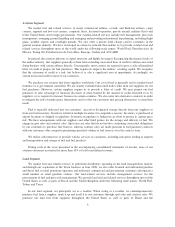World Fuel Services 2008 Annual Report Download - page 21
Download and view the complete annual report
Please find page 21 of the 2008 World Fuel Services annual report below. You can navigate through the pages in the report by either clicking on the pages listed below, or by using the keyword search tool below to find specific information within the annual report.In addition, compliance with existing and future environmental laws regulating underground storage tanks
located at the retail gasoline stations that we operate may require significant capital expenditures and increased
operating and maintenance costs. The remediation and other costs required to clean up or treat contaminated sites
could be substantial. We pay tank registration fees and other taxes to state trust funds established in our operating
areas and maintain private insurance coverage to support future remediation obligations, but if any of the state
trust funds become insolvent or are discontinued for any reason, or if they or our insurers fail to pay for
remediation, we would be obligated to make those payments, which could be substantial.
If we are held liable for clean up and other costs related to several businesses we exited, which handled
hazardous and non-hazardous waste, such liability could adversely affect our business and financial
condition.
We have exited several businesses, such as the used oil recycling business, that handled hazardous and
non-hazardous waste. We treated and/or transported this waste to various disposal facilities in the U.S. We have
been sued in the past and may be sued in the future as a potentially responsible party for the clean up of such
disposal facilities and may be held liable for these and other clean up costs pursuant to United States federal and
state laws and regulations. In addition, under these laws and regulations, we may be required to clean up facilities
previously operated by us.
Our operations may be adversely affected by competition from other energy sources.
Fuel competes with other sources of energy, some of which are less costly on an equivalent energy basis. In
addition, we cannot predict the effect that the development of alternative energy sources might have on our
operations.
Current and future litigation could have an adverse effect on the Company.
The Company is currently involved in certain legal proceedings in the ordinary course of its business.
Lawsuits and other legal proceedings can involve substantial costs, including the costs associated with
investigation, litigation and possible settlement, judgment, penalty or fine. Although insurance is maintained to
mitigate these costs, there can be no assurance that costs associated with lawsuits or other legal proceedings will
not exceed the limits of insurance policies. The Company’s results of operations could be adversely affected if a
judgment, penalty or fine is not fully covered by insurance.
We are exposed to risks from legislation requiring companies to have adequate internal controls over
financial reporting and to evaluate those internal controls.
Section 404 of the Sarbanes-Oxley Act of 2002 requires our management to assess, and our independent
registered public accounting firm to attest to, the effectiveness of our internal control structure and procedures for
financial reporting. We completed an evaluation of the effectiveness of our internal control over financial
reporting for the fiscal year ended December 31, 2008, and we have an ongoing program to perform the system
and process evaluation and testing necessary to continue to comply with these requirements. However, neither
our management’s evaluation of our internal control over financial reporting nor the audit of internal controls
included the Texor business. In addition, we have expansive international operations, the scope and breadth of
which exacerbate the risks associated with our internal controls. Accordingly, we expect to continue to incur
increased expense and to devote additional management resources to Section 404 compliance. In the event that
our chief executive officer, chief financial officer or independent registered public accounting firm determines
that our internal control over financial reporting is not effective as defined under Section 404, investor
perceptions and our reputation may be adversely affected and the market price of our stock could decline.
Moreover, even if we and our auditors do not identify any concerns about our internal control system, it may not
prevent all potential errors or fraud.
13
























